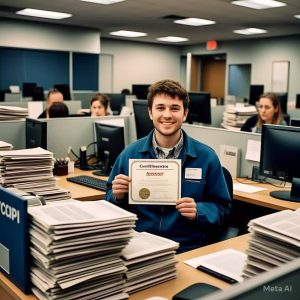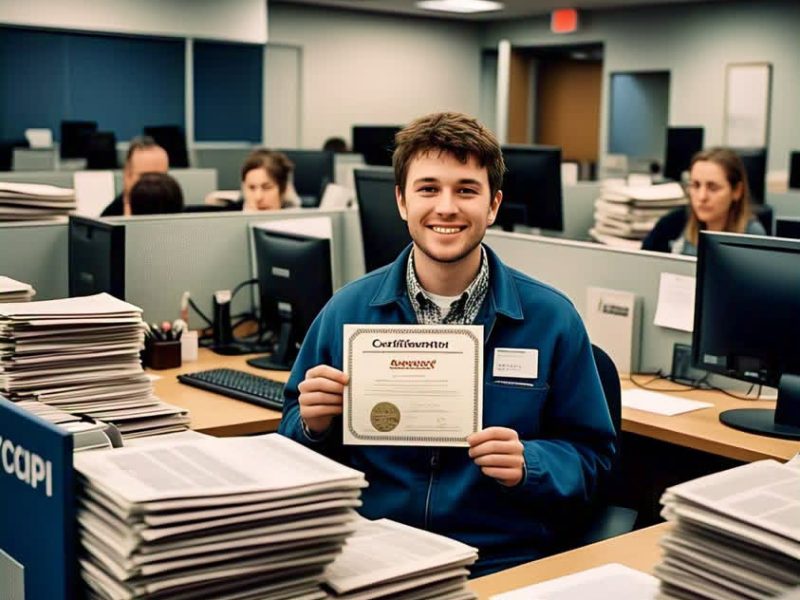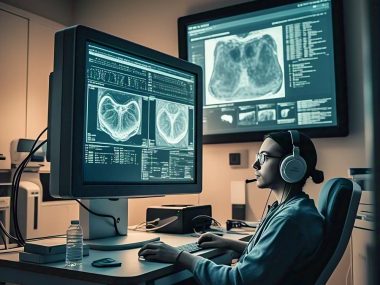
The United States remains one of the most sought-after destinations for professionals seeking career advancement, especially in the medical and laboratory sciences. If you hold an ASCPI certificate, you are already on a path toward numerous opportunities in the U.S. job market. The American Society for Clinical Pathology International (ASCPI) certification is recognized by employers, healthcare institutions, and regulatory bodies across the country. This certification opens doors to a variety of roles, offering competitive salaries, career growth, and the chance to work in some of the world’s most advanced healthcare facilities.
Understanding the ASCPI Certificate
The ASCPI certificate is an international credential awarded by the American Society for Clinical Pathology (ASCP), one of the most reputable certification agencies in the medical laboratory field. While the ASCP certification is primarily for U.S.-based professionals, the ASCPI certificate is specifically designed for international candidates who meet the required educational and professional experience criteria. This certification is a testament to your expertise, ensuring that you meet the high standards required to practice in U.S. laboratories.
Obtaining an ASCPI certificate validates your proficiency in laboratory science disciplines such as microbiology, hematology, immunology, and clinical chemistry. Employers in the U.S. recognize the ASCPI certificate, making it a valuable asset for professionals planning to work in the country.
Benefits of Working in the USA with an ASCPI Certificate
1. Increased Job Opportunities
Having an ASCPI certificate significantly increases your chances of securing employment in the U.S. Many healthcare institutions, diagnostic laboratories, and research centers require or prefer professionals with ASCP or ASCPI certification. This certification sets you apart from other international applicants, demonstrating that you possess the necessary skills and knowledge.
2. Competitive Salary and Benefits
Medical laboratory professionals with an ASCPI certificate can expect competitive salaries in the U.S. Depending on your experience and specialization, salaries range from $50,000 to over $80,000 per year. Additionally, many U.S. employers offer benefits such as health insurance, retirement plans, paid leave, and opportunities for further education and training.
3. Career Advancement Opportunities
Earning an ASCPI certificate is just the beginning of your career growth. Once you start working in the U.S., you can pursue further certifications, specializations, and leadership roles. Many laboratory professionals use their ASCPI certification as a stepping stone to higher positions, such as laboratory supervisors, managers, or even educators in medical institutions.
4. Access to Advanced Technology and Research
The U.S. healthcare system is known for its advanced technology and research facilities. Working in the U.S. with your ASCPI certificate allows you to gain hands-on experience with cutting-edge diagnostic tools, automation systems, and innovative laboratory techniques. This experience enhances your skills and makes you more competitive in the global job market.
Steps to Work in the USA with Your ASCPI Certificate
1. Meet the Certification Requirements
Before applying for jobs in the U.S., ensure that you meet the eligibility requirements for the ASCPI certificate. These requirements typically include:
•A degree in medical laboratory science or a related field
•Relevant work experience in a laboratory setting
•Passing the ASCPI certification exam
2. Verify Your Credentials
Once you obtain your ASCPI certificate, you may need to have your credentials verified by agencies such as the Commission on Graduates of Foreign Nursing Schools (CGFNS) or other credential evaluation services. Some states may require additional verification before you can practice.
3. Obtain a Visa or Work Authorization
To legally work in the U.S., you need a visa or work authorization. Some common visa options include:
•H-1B Visa: For highly skilled professionals, including medical laboratory scientists with an ASCPI certificate.
•TN Visa: Available for Canadian and Mexican citizens under the United States-Mexico-Canada Agreement (USMCA).
•Green Card Sponsorship: Some employers offer sponsorship for permanent residency.
4. Apply for Jobs in the U.S.
With your ASCPI certificate and work authorization, you can start applying for jobs. Look for openings in hospitals, private laboratories, research institutions, and academic centers. Online job platforms such as Indeed, LinkedIn, and ASCP’s career center can help you find suitable positions.
5. Prepare for Interviews and Licensing Requirements
Once you secure job interviews, be prepared to discuss your ASCPI certification, laboratory experience, and technical skills. Some states may also require you to obtain a state-specific laboratory license before you can start working. Research the licensing requirements for the state where you plan to work.

Career Paths for ASCPI-Certified Professionals in the USA
Your ASCPI certificate qualifies you for various roles in the U.S. medical and laboratory sciences field. Some of the common career paths include:
1. Medical Laboratory Scientist (MLS)
As a medical laboratory scientist, you will conduct diagnostic tests on blood, urine, tissue, and other specimens to help doctors diagnose and treat diseases. Your ASCPI certification ensures that you are well-trained for this critical role.
2. Histotechnologist (HTL)
With an ASCPI certificate, you can work as a histotechnologist, preparing tissue samples for microscopic examination. This field is crucial in disease diagnosis, particularly in oncology and pathology.
3. Cytotechnologist (CT)
Cytotechnologists analyze cell samples for abnormalities, including cancerous cells. Your ASCPI certification makes you a strong candidate for this specialized role in hospitals and research labs.
4. Blood Bank Technologist (BB)
Blood bank technologists are responsible for blood typing, compatibility testing, and ensuring safe blood transfusions. Employers in the U.S. recognize ASCPI-certified professionals for these highly specialized roles.
5. Molecular Biology Technologist (MB)
With advancements in genetic testing and molecular diagnostics, the demand for molecular biology technologists is increasing. Your ASCPI certificate can qualify you for cutting-edge roles in DNA analysis, forensic science, and infectious disease research.
Overcoming Challenges as an ASCPI-Certified Professional in the U.S.
While your ASCPI certificate provides many opportunities, international professionals may face certain challenges when transitioning to the U.S. workforce. Here’s how to overcome them:
1. Adapting to U.S. Workplace Culture
Understanding American workplace culture, including teamwork, communication, and patient confidentiality regulations, is essential for success. Taking part in orientation programs and networking with fellow professionals can help you adjust.
2. Meeting State Licensing Requirements
Some states require additional licensing beyond your ASCPI certificate. Research the specific state requirements and prepare for any necessary exams or paperwork.
3. Finding Sponsorship for Work Visas
Securing a work visa can be challenging. To improve your chances, apply to large hospital systems and national laboratory networks that have experience sponsoring foreign professionals.
4. Continuing Education and Specialization
To stay competitive in the U.S. job market, consider pursuing additional certifications, workshops, and continuing education courses. The ASCP offers various advanced certifications that can further enhance your career prospects.
Conclusion
Working in the USA with your ASCPI certificate is a promising opportunity for laboratory professionals seeking career growth, competitive salaries, and exposure to advanced medical technologies. By obtaining the necessary certification, verifying your credentials, securing a work visa, and applying for jobs strategically, you can successfully transition into the U.S. workforce.
The ASCPI certification not only validates your skills but also sets you apart in a competitive job market. Whether you aspire to work as a medical laboratory scientist, histotechnologist, or molecular biology technologist, the U.S. offers a wealth of opportunities for ASCPI-certified professionals. With careful planning and persistence, you can build a rewarding career in the American healthcare industry.





